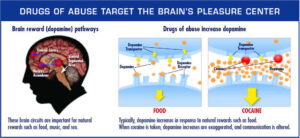Guest blog post by Stephanie Gutzmer, Au.D., E-RYT
Why is addiction considered a disease? The simple answer is because it changes your brain structure. However, the answer and the process is far from simple and much more dramatic. Learn how this disease moves the user from choosing to use to feeling compelled to use, perpetuating addiction.
Definition of Disease
 Let’s begin with the basics. A disease is an abnormal ailment that negatively affects the function or structure of a being. It’s a condition that isn’t “normal,” causing pain, dysfunction, distress, social problems, or death.
Let’s begin with the basics. A disease is an abnormal ailment that negatively affects the function or structure of a being. It’s a condition that isn’t “normal,” causing pain, dysfunction, distress, social problems, or death.
For many, the choice to begin using alcohol or drugs is voluntary. However, over repeated use, it begins to change the user’s structure and functioning of their brain, just like cancer, diabetes, and heart disease alters the functioning of your body. This is why addiction is considered a disease – the choice to use no longer becomes a choice.
Related Reading: 25 Overcoming Addiction Quotes that will Inspire You
How Addiction Changes Your Brain
Addiction changes your brain in such a way that it impairs the addict’s ability to maintain self-control, make good decisions, and control impulses. This change specifically happens in the prefrontal cortex and in how rewards are processed in the brain. Ultimately, the result of these changes make it difficult for the addicted person to stop using.
What is the Prefrontal Cortex?
The prefrontal cortex is part of the frontal lobe, which lies in the very front portion of your brain, right behind your forehead. The frontal lobe controls primary cognitive skills, like emotional expression, problem solving, memory, language, judgment, and motor control. The frontal lobe controls much of our personality.
One of the biggest jobs of the prefrontal cortex is executive function. Executive function focuses on controlling reflexive behaviors, decision-making, problem-solving, self-control, and acting in ways that align with long-term goals. Damage to the prefrontal cortex from injury or disease can change your personality, emotional control, and ability to assess risk and danger. All of these changes are seen with addiction.
Related Reading: Why so many People Struggle with Overcoming Addiction and Destructive Habits
The Reward Pathway
The frontal lobe, along with other regions of the brain, is also involved in the reward pathway. But, before we can continue with why addiction is considered a disease, we need to understand how the reward system in our brains works.
Human action is driven by obtaining necessities, like food, sleep, and rewards. Rewards are any object, event, or activity that motivates us, causes us to learn, or fosters pleasurable feelings. The reward system involves different brain structures, each with a different function:
- The amygdala is in charge of emotions and recognition that a reward exists and how rewarding it was. The amygdala does this based on the amount of dopamine released in the system. (More on dopamine in a moment.)
- The nucleus accumbens is responsible for controlling the motor functions of your body, so you can reach out or physically act in a way to resume experiencing the reward.
- The prefrontal cortex helps with focus, attention, and planning so you can continue enjoying the reward.
- The hippocampus forms memories. So, when you experience something pleasurable or rewarding, dopamine triggers the hippocampus to make sure you remember what you did that made you feel so good.
 How your brain does this and all the other amazing things it can do is with neurotransmitters. Neurotransmitters are chemical messengers that transmit signals between brain cells, nerves, and cells in the body. Dopamine, the primary neurotransmitter in the reward system, is released in the brain when we expect to receive a reward and are enjoying the reward.
How your brain does this and all the other amazing things it can do is with neurotransmitters. Neurotransmitters are chemical messengers that transmit signals between brain cells, nerves, and cells in the body. Dopamine, the primary neurotransmitter in the reward system, is released in the brain when we expect to receive a reward and are enjoying the reward.
However, an important thing to note with rewards is it’s not the reward itself that matters, but rather the expectation of how valuable the reward is. When the reward is higher than predicted, more dopamine is released. If the reward is less than expected, dopamine release decreases. The more dopamine released, the more your amygdala screams, “this is awesome!” and craves more.
Your Brain on Drugs
Drugs significantly increase the levels of naturally occurring dopamine in the brain – nearly five to ten times the average level. At first blush you might think more of a neurotransmitter promoting pleasure would be a good thing. But in reality, it is far from a good thing. When more dopamine is artificially generated through drug use, your brain begins to associate the drug with an outsized reward.
 And with this enormous reward, comes the craving for more. With more and continued drug use, your brain adjusts to the high levels of dopamine and begins to believe this is normal. This is where addiction is born – the “normal” levels of dopamine that your brain expects are no longer achieved naturally, but only with drugs.
And with this enormous reward, comes the craving for more. With more and continued drug use, your brain adjusts to the high levels of dopamine and begins to believe this is normal. This is where addiction is born – the “normal” levels of dopamine that your brain expects are no longer achieved naturally, but only with drugs.
Your brain’s reward system loves the extreme high and wants more – craves more. But the more you use, the more the elevated dopamine release becomes the new “normal” for the brain. Once this “normal” becomes expected, the elevated dopamine level doesn’t create the same intensity of high it once did. But you crave more to get that same reward – the same high.
So quickly, your brain’s reward system becomes skewed, and cravings begin to influence behavior. Little things, like familiar street corners, can become a trigger. And changes in your brain over continued drug use limits your ability to resist.
Related Reading: Why am I Not Enough for my Loved One to Quit?
Why is Addiction Considered a Disease?
These brain changes and the resulting behavioral changes are why addiction is considered a disease. Addiction is a disease because it changes the structures of your brain – specifically the amygdala and prefrontal cortex.
 In short, drugs hijack the reward pathway by artificially increasing the amount of dopamine released while using. Remember, the amygdala assesses the value of a reward. If the amount of dopamine released with the reward is more significant than expected, your brain learns to value this reward. Drugs will always release more dopamine than can ever be predicted, so your brain will consistently be reinforced in this way, making you want more and more.
In short, drugs hijack the reward pathway by artificially increasing the amount of dopamine released while using. Remember, the amygdala assesses the value of a reward. If the amount of dopamine released with the reward is more significant than expected, your brain learns to value this reward. Drugs will always release more dopamine than can ever be predicted, so your brain will consistently be reinforced in this way, making you want more and more.
The amygdala is also part of our fight-or-flight system, which prepares your body to defend yourself or run in the presence of danger. Addiction sends your amygdala into overdrive, making you feel more anxious when you aren’t using – many who are at this stage in addiction use to avoid feeling worried rather than using it for pleasure. You are using to avoid feeling bad, but you are feeling bad because of the drugs – it becomes a self-reinforcing cycle.
 Addiction also damages the prefrontal cortex, which is the decision-making center. According to Dr. Nora Volkow, director of NIH’s National Institute on Drug Abuse, “brain imaging studies of people addicted to drugs or alcohol show decreased activity in the frontal cortex. When the frontal cortex isn’t working properly, people can’t make the decision to stop taking the drug – even if they realize the price of taking that drug may be extremely high.” Drugs affect the prefrontal cortex in such a way that it makes it difficult to make good decisions and have self-control.
Addiction also damages the prefrontal cortex, which is the decision-making center. According to Dr. Nora Volkow, director of NIH’s National Institute on Drug Abuse, “brain imaging studies of people addicted to drugs or alcohol show decreased activity in the frontal cortex. When the frontal cortex isn’t working properly, people can’t make the decision to stop taking the drug – even if they realize the price of taking that drug may be extremely high.” Drugs affect the prefrontal cortex in such a way that it makes it difficult to make good decisions and have self-control.
So why is addiction considered a disease? Drugs and addiction alter brain chemistry in a way that makes it difficult to function like one used to. It makes it difficult to make good decisions and have self-control, all while having intense impulses to continue using.
Related Reading: 9 Strategies for Overcoming Fear in Addiction Recovery
What Does This Mean for Overcoming Addiction?
Those who become addicted quickly lose the choice of whether to use or not. It’s not about will-power, strength, or morality. It’s essential to recognize biological forces are at play in fundamentally perpetuating addiction. However, people with addiction can stop – it’s just significantly harder than for those who are not addicted.
If you or a loved one is struggling with addiction, reach out to a qualified professional for help. Recovery is possible with treatment and support. If you live in the Chicagoland area, Life Care Wellness has qualified therapists who can assist you on your journey. Treatment and addiction counseling works – contact us today to the road to recovery.




